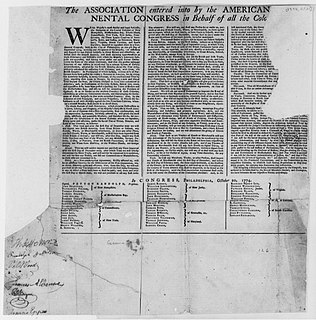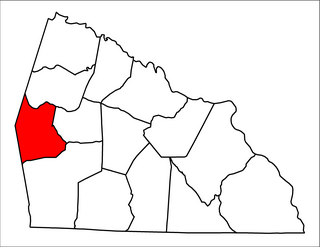Related Research Articles

The Thirteen Colonies, also known as the Thirteen British Colonies or the Thirteen American Colonies, were a group of colonies of Great Britain on the Atlantic coast of North America founded in the 17th and 18th centuries which declared independence in 1776 and formed the United States of America. The Thirteen Colonies had very similar political, constitutional, and legal systems, and were dominated by Protestant English-speakers. The New England colonies, as well as the colonies of Maryland and Pennsylvania, were founded primarily for religious beliefs, while the other colonies were founded for business and economic expansion. All thirteen were part of Britain's possessions in the New World, which also included colonies in Canada, Florida, and the Caribbean.

The Stamp Act Congress, also known as the Continental Congress of 1765, was a meeting held in New York, New York, consisting of representatives from some of the British colonies in North America. It was the first gathering of elected representatives from several of the American colonies to devise a unified protest against new British taxation. Parliament had passed the Stamp Act, which required the use of specialty stamped paper for legal documents, playing cards, calendars, newspapers, and dice for virtually all business in the colonies starting on November 1, 1765.

"No taxation without representation" is a political slogan that originated in the American Revolution, and which expressed one of the primary grievances of the American colonists against Great Britain. In short, many colonists believed that as they were not represented in the distant British parliament, any taxes it imposed on the colonists were unconstitutional, and were a denial of the colonists' rights as Englishmen.

William "Billy" Sharpe was a lawyer, politician, American Revolution patriot, and a delegate to the Continental Congress from Rowan County, North Carolina, which became Iredell County in 1788.

The Continental Association, often known simply as the "Association", was a system created by the First Continental Congress in 1774 for implementing a trade boycott with Great Britain. Congress hoped that, by imposing economic sanctions, they would pressure Britain into addressing the grievances of the colonies, in particular repealing the Intolerable Acts passed by Parliament. The Association aimed to alter Britain's policies toward the colonies without severing allegiance.
The committees of correspondence were shadow governments organized by the Patriot leaders of the Thirteen Colonies on the eve of the American Revolution. They coordinated responses to England and shared their plans; by 1764 they had emerged as shadow governments, superseding the colonial legislature and royal officials. The Maryland Committee of Correspondence was instrumental in setting up the First Continental Congress, which met in Philadelphia. These served an important role in the Revolution, by disseminating the colonial interpretation of British actions between the colonies and to foreign governments. The committees of correspondence rallied opposition on common causes and established plans for collective action, and so the group of committees was the beginning of what later became a formal political union among the colonies.
In response to the Stamp and Tea Acts, the Declaration of Rights and Grievances was a document written by the Stamp Act Congress and passed on October 14, 1765. American colonists opposed the acts because they were passed without the consideration of the colonists’ opinion. The Declaration of Rights raised fourteen points of colonial protest but was not directed exclusively at the Stamp Act of 1765, which required that documents, newspapers, and playing cards be printed on special stamped and taxed paper. In addition to the specific protests of the Stamp Act taxes, it made the assertions which follow:

The First Continental Congress was a meeting of delegates from 12 of the 13 British colonies that became the United States. It met from September 5 to October 26, 1774, at Carpenters' Hall in Philadelphia, Pennsylvania, after the British Navy instituted a blockade of Boston Harbor and Parliament passed the punitive Intolerable Acts in response to the December 1773 Boston Tea Party. During the opening weeks of the Congress, the delegates conducted a spirited discussion about how the colonies could collectively respond to the British government's coercive actions, and they worked to make common cause.
The Fairfax Resolves were a set of resolutions adopted by a committee in Fairfax County in the colony of Virginia on July 18, 1774, in the early stages of the American Revolution. Written primarily by George Mason, the resolutions rejected the British Parliament's claim of supreme authority over the American colonies. More than thirty counties in Virginia passed similar resolutions in 1774, "but the Fairfax Resolves were the most detailed, the most influential, and the most radical."
The North Carolina Provincial Congresses were extra-legal unicameral legislative bodies formed in 1774 through 1776 by the people of the Province of North Carolina, independent of the British colonial government. There were five congresses. They met in the towns of New Bern, Halifax, and Hillsborough (3rd). The 4th conference approved the Halifax Resolves a set of resolutions that empowered the state's delegates to the Second Continental Congress to concur in the Declaration of Independence from Great Britain. The 5th conference approved the Constitution of North Carolina and elected Richard Caswell as governor of the State of North Carolina. After the 5th conference, the new North Carolina General Assembly met in April 1777.

Mount Ulla Township is one of fourteen townships in Rowan County, North Carolina, United States. It is currently the smallest township in Rowan County by population.
The Provincial Congresses were extra-legal legislative bodies established in ten of the Thirteen Colonies early in the American Revolution. Some were referred to as congresses while others used different terms for a similar type body. These bodies were generally renamed or replaced with other bodies when the provinces declared themselves states.

The Massachusetts Provincial Congress (1774–1780) was a provisional government created in the Province of Massachusetts Bay early in the American Revolution. Based on the terms of the colonial charter, it exercised de facto control over the rebellious portions of the province, and after the British withdrawal from Boston in March 1776, the entire province. When Massachusetts Bay declared its independence in 1776, the Congress continued to govern under this arrangement for several years. Increasing calls for constitutional change led to a failed proposal for a constitution produced by the Congress in 1778, and then a successful constitutional convention that produced a constitution for the state in 1780. The Provincial Congress came to an end with elections in October 1780.
The Declaration and Resolves of the First Continental Congress, was a statement adopted by the First Continental Congress on October 14, 1774, in response to the Intolerable Acts passed by the British Parliament. The Declaration outlined colonial objections to the Intolerable Acts, listed a colonial bill of rights, and provided a detailed list of grievances. It was similar to the Declaration of Rights and Grievances, passed by the Stamp Act Congress a decade earlier.
The Salisbury District of North Carolina, was originally one of six colonial judicial districts established in 1766 by the Governor William Tryon of the Province of North Carolina. Immediately preceding the onset of the American War of Independence in 1775, these six regions were renamed "Military districts" by the North Carolina Provincial Congress and used for organizing the North Carolina militia. The other districts were Edenton, Halifax, Hillsborough, New Bern, and Wilmington districts. The districts designation was discontinued in 1835 during the North Carolina Constitution Convention.
The constitutional history of opposition to taxation is sufficiently interesting to be abstracted from broader contexts. Key action occurred in the Colony of Virginia in the decade before 1776. A particular protest document, arguably the most eloquent and most effective among many colonial protests, merits special attention.
Adlai Osborne was a lawyer, public official, plantation owner, and educational leader from Rowan County, North Carolina (became Iredell County in 1788. During the American Revolution, he served on the Rowan County Committee of Safety and commanded the 2nd Rowan County Regiment of the North Carolina militia. He was elected as a delegate to the Continental Congress, but did not serve. In 1789, he was a delegate to the convention in Fayetteville that ratified the United States Constitution.
The Rowan County Committee of Safety was one of the 18 Committees of Safety in North Carolina authorized by the Continental Congress and endorsed by the Second North Carolina Provincial Congress. It was established in Rowan County, North Carolina in 1774. Meeting minutes from 1774 to 1776 have survived and are available through a digital collection. The Rowan County Committee of Safety was instrumental in banning trade with Britain and preparing for the American Revolution. One of its major achievements was the Rowan Resolves.
The Augusta Resolves was a statement adopted on February 22, 1775 by six representatives of Augusta County, Colony of Virginia, in the early stages of the American Revolution. The resolves expressed support for Congress' resistance to the Intolerable Acts, issued in 1774 by the British Parliament, and a commitment to risk 'lives and fortune' in preservation of natural rights.
The First North Carolina Provincial Congress was the first of five extra-legal unicameral bodies that met beginning in the summer of 1774. They were modeled after the colonial lower house. These congresses created a government structure, issued bills of credit to pay for the movement, and organized an army for defense, in preparation for the state of North Carolina. This First Congress met in New Bern from August 25 to August 27, 1774. John Harvey served as president. These Provincial congresses paved the way for the first meeting of the North Carolina General Assembly on April 7, 1777 in New Bern, North Carolina.
References
- ↑ "Resolutions by inhabitants of Rowan County concerning resistance to Parliamentary taxation and the Provincial Congress of North Carolina". Documenting the American South. Colonial and State Records of North Carolina. August 8, 1774. Retrieved July 3, 2018.
- ↑ Petrucelli, Katherine Sanford, ed. (1991). The Heritage of Rowan County North Carolina. I. Salisbury, N.C.: The Genealogical Society of Rowan County. pp. xvi.
- ↑ "Library to celebrate historic 'Rowan Resolves'". Salisbury Post. December 1, 2009. Retrieved July 4, 2018.
One of the authors is my fourth great grandfather. You have him as Abraham Dinton. It is actually Abraham Denton. I have never seen his name spelled other than Denton. Thanks for letting me edit. Norma Drake